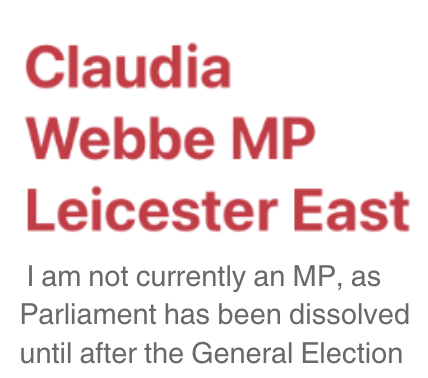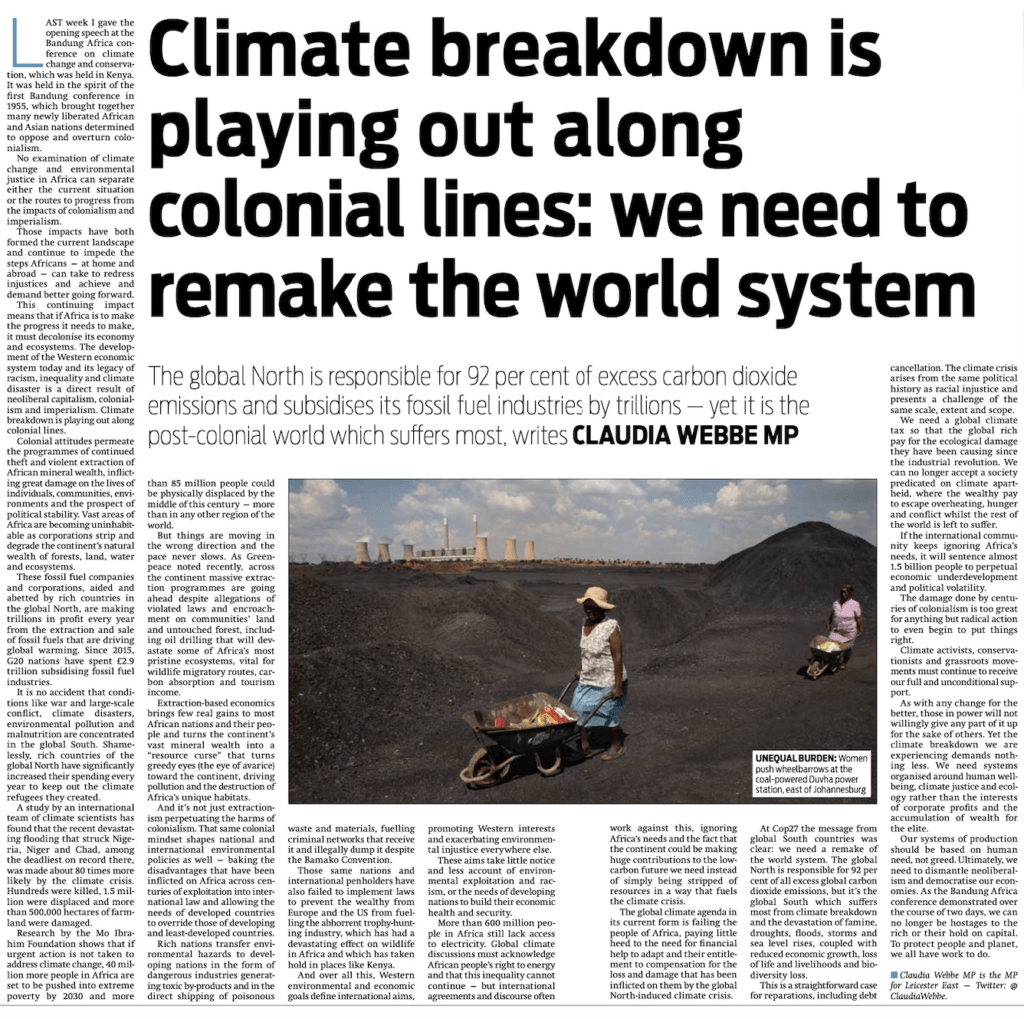Climate breakdown is playing out along colonial lines: we need to remake the world system
By Claudia Webbe MP
The global North is responsible for 92 per cent of excess carbon dioxide emissions and subsidises its fossil fuel industries by trillions — yet it is the post-colonial world which suffers most, writes CLAUDIA WEBBE MP
LAST week I gave the opening speech at the Bandung Africa conference on climate change and conservation, which was held in Kenya. It was held in the spirit of the first Bandung conference in 1955, which brought together many newly liberated African and Asian nations determined to oppose and overturn colonialism.
No examination of climate change and environmental justice in Africa can separate either the current situation or the routes to progress from the impacts of colonialism and imperialism.
Those impacts have both formed the current landscape and continue to impede the steps Africans — at home and abroad — can take to redress injustices and achieve and demand better going forward.
This continuing impact means that if Africa is to make the progress it needs to make, it must decolonise its economy and ecosystems. The development of the Western economic system today and its legacy of racism, inequality and climate disaster is a direct result of neoliberal capitalism, colonialism and imperialism. Climate breakdown is playing out along colonial lines.
Colonial attitudes permeate the programmes of continued theft and violent extraction of African mineral wealth, inflicting great damage on the lives of individuals, communities, environments and the prospect of political stability. Vast areas of Africa are becoming uninhabitable as corporations strip and degrade the continent’s natural wealth of forests, land, water and ecosystems.
These fossil fuel companies and corporations, aided and abetted by rich countries in the global North, are making trillions in profit every year from the extraction and sale of fossil fuels that are driving global warming. Since 2015, G20 nations have spent £2.9 trillion subsidising fossil fuel industries.
It is no accident that conditions like war and large-scale conflict, climate disasters, environmental pollution and malnutrition are concentrated in the global South. Shamelessly, rich countries of the global North have significantly increased their spending every year to keep out the climate refugees they created.
A study by an international team of climate scientists has found that the recent devastating flooding that struck Nigeria, Niger and Chad, among the deadliest on record there, was made about 80 times more likely by the climate crisis. Hundreds were killed, 1.5 million were displaced and more than 500,000 hectares of farmland were damaged.
Research by the Mo Ibrahim Foundation shows that if urgent action is not taken to address climate change, 40 million more people in Africa are set to be pushed into extreme poverty by 2030 and more than 85 million people could be physically displaced by the middle of this century — more than in any other region of the world.
But things are moving in the wrong direction and the pace never slows. As Greenpeace noted recently, across the continent massive extraction programmes are going ahead despite allegations of violated laws and encroachment on communities’ land and untouched forest, including oil drilling that will devastate some of Africa’s most pristine ecosystems, vital for wildlife migratory routes, carbon absorption and tourism income.
Extraction-based economics brings few real gains to most African nations and their people and turns the continent’s vast mineral wealth into a “resource curse” that turns greedy eyes (the eye of avarice) toward the continent, driving pollution and the destruction of Africa’s unique habitats.
And it’s not just extractionism perpetuating the harms of colonialism. That same colonial mindset shapes national and international environmental policies as well — baking the disadvantages that have been inflicted on Africa across centuries of exploitation into international law and allowing the needs of developed countries to override those of developing and least-developed countries.
Rich nations transfer environmental hazards to developing nations in the form of dangerous industries generating toxic by-products and in the direct shipping of poisonous waste and materials, fuelling criminal networks that receive it and illegally dump it despite the Bamako Convention.
Those same nations and international penholders have also failed to implement laws to prevent the wealthy from Europe and the US from fuelling the abhorrent trophy-hunting industry, which has had a devastating effect on wildlife in Africa and which has taken hold in places like Kenya.
And over all this, Western environmental and economic goals define international aims, promoting Western interests and exacerbating environmental injustice everywhere else.
These aims take little notice and less account of environmental exploitation and racism, or the needs of developing nations to build their economic health and security.
More than 600 million people in Africa still lack access to electricity. Global climate discussions must acknowledge African people’s right to energy and that this inequality cannot continue — but international agreements and discourse often work against this, ignoring Africa’s needs and the fact that the continent could be making huge contributions to the low-carbon future we need instead of simply being stripped of resources in a way that fuels the climate crisis.
The global climate agenda in its current form is failing the people of Africa, paying little heed to the need for financial help to adapt and their entitlement to compensation for the loss and damage that has been inflicted on them by the global North-induced climate crisis.
At Cop27 the message from global South countries was clear: we need a remake of the world system. The global North is responsible for 92 per cent of all excess global carbon dioxide emissions, but it’s the global South which suffers most from climate breakdown and the devastation of famine, droughts, floods, storms and sea level rises, coupled with reduced economic growth, loss of life and livelihoods and biodiversity loss.
This is a straightforward case for reparations, including debt cancellation. The climate crisis arises from the same political history as racial injustice and presents a challenge of the same scale, extent and scope.
We need a global climate tax so that the global rich pay for the ecological damage they have been causing since the industrial revolution. We can no longer accept a society predicated on climate apartheid, where the wealthy pay to escape overheating, hunger and conflict whilst the rest of the world is left to suffer.
If the international community keeps ignoring Africa’s needs, it will sentence almost 1.5 billion people to perpetual economic underdevelopment and political volatility.
The damage done by centuries of colonialism is too great for anything but radical action to even begin to put things right.
Climate activists, conservationists and grassroots movements must continue to receive our full and unconditional support.
As with any change for the better, those in power will not willingly give any part of it up for the sake of others. Yet the climate breakdown we are experiencing demands nothing less. We need systems organised around human wellbeing, climate justice and ecology rather than the interests of corporate profits and the accumulation of wealth for the elite.
Our systems of production should be based on human need, not greed. Ultimately, we need to dismantle neoliberalism and democratise our economies. As the Bandung Africa conference demonstrated over the course of two days, we can no longer be hostages to the rich or their hold on capital. To protect people and planet, we all have work to do.
Claudia Webbe MP is the member of Parliament for Leicester East. You can follow her at www.facebook.com/claudiaforLE and twitter.com/ClaudiaWebbe



